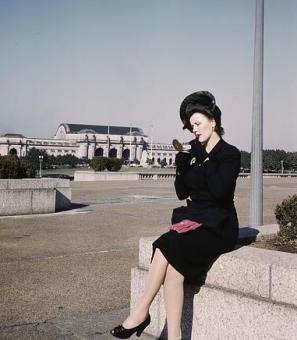Intent to Kill: A Real-Life Noir
While sifting through the virtual archives of some local publications, I came across an incident from 1947 that stood apart. Unlike most news, the event read like a Film Noir. This real-life tale was juicy enough to make headlines for days, suspenseful enough to make me wonder about motives, and hard-boiled enough to speak volumes to the disenchantment of the people involved. So, this article will look a little different from what we usually do at Boundary Stones. Rather than presenting the facts in a linear, scholarly manner, we have decided that this story shines best as a piece of narrative nonfiction. While every sentence is grounded in research, we held off on footnotes to let the story breathe, and took a few creative liberties to bring the characters to life. For variety, my dear reader, is the spice of life.
. . .
It was July in Washington, and John Bricker perspired in his suit as he descended underground, to take the subway that would transport him from the Senate office building to the Capitol.[1] It was hotter than the day before, nearly 80 degrees. He was hoping for a win that day: three years earlier, he ran for Vice President alongside Thomas Dewey, but lost by a landslide to that old coot FDR. Not only did the New Deal deplete American resources and recklessly spend American money, it was an outright desecration of the spiritual foundations of American government. The debate today would be important: $4,000,000,000 of income tax cuts were on the line. It was his second year as a Senator, and he was determined to give it his all.
Back in Ohio, he built himself up from the ground. Few would guess that a man who was a first lieutenant in the First World War, who passed the bar to become a solicitor, and rose the ranks from Attorney General to the very Governor of Ohio was born on a farm. He was a true believer in local government, so moving to Washington was a bit of an adjustment. But, Bricker was getting along: politics came naturally to him.
It was quiet at the station, typical of a Saturday. “Good morning, Macomber,” he said genially to a man he recognized as a Capitol employee. They exchanged pleasantries as they prepared to board the subway car.
As the two approached the monorail, Bricker noticed a movement out of the corner of his eye. He glanced over and saw a man walking toward him with intent—a thin man with silver hair, tan pants and a blue coat. A World War I button glinted on his lapel. Bricker narrowed his eyes, remembering that he had met this man before: he was a fellow Ohioan, who had approached him multiple times about some financial losses he had suffered in Columbus fifteen years back, when Bricker was Attorney General. The man struck him as somewhat odd, bringing up matters so far in the past. To be polite at the time, Bricker told him he would see what he could do about it. Yet, the man came to him again outside his office just yesterday. Before the fellow could solicit patronage again, Bricker said: “I’m sorry if you lost anything. I wish something could be done about it.” And that was that.
Of course, all these recollections flashed through Bricker’s mind in an instant—the instant before something dark gleamed in the silver-haired man’s hand, and he said, “This is to refresh your memory.”
CRACK!
Momentarily stunned, Senator Bricker realized that the man had just shot at him with a .22 caliber target pistol. Bricker practically flew to the subway car, clutching Macomber to run with him.
“Jerry, let’s get the hell out of here! I think that man is crazy,” Bricker shouted to the subway car operator. Through the window, they saw the man along a railing above the subway, pointing his gun right at them. The two men dropped to the floor of the empty car as another bullet rang out, F’TANG! It clattered against the wall of the tunnel.
The train made a hasty escape, being swallowed into safety by a tunnel. From under two seats, Bricker and Macomber looked at each other, with shock and relief. “Well that was a close one,” said Macomber. “Just another day!” replied Bricker with an ironic chuckle, “Certainly that man must have been a poor shot, or he was firing blanks to prove some sort of point. Now that I think it over, that makes a lot of sense.”
While it was certainly quite the kerfuffle, Bricker wouldn’t let the crazy incident overthrow his day. When the subway operator asked him what to do, he told him to keep going toward the Capitol. When he arrived, he placed a telephone call to his secretary. “Miss Brial, would you please cancel my reservation to the Governors’ conference at Salt Lake City? Tell them I’ll leave for Utah tomorrow if the Senate votes on the tax bill today.” CLICK.
By this point, news of the shooting had spread amongst the other congressmen. They were in an excited frenzy. “Is it true, Bricker, did a mad man really try to kill you?”
“He was a disgruntled patronage seeker. By the name of Kaiser, I believe. He’s approached me a few times before about some money that he lost back in Ohio. I was lucky to be missed. You know, I make a pretty big target," Bricker laughed. "But, I am under the belief that he was firing blanks to try to scare me. I suppose I should tell the police to go after the man.” The surrounding Senators shook their heads in disbelief and patted his arm.
“There’s a phone call for you.” It was Bricker’s secretary: “Excuse me sir, but I heard that a man tried to shoot you today. Is it true? Are you all right?”
“Oh there was nothing to it. Somebody fired some blanks at me. Thank you Miss Brial, that will be all.”
In the meantime, William L. Kaiser, the assailant, leaned against the wall of the Senate Office Building rotunda with his pistol still in hand. Bricker had escaped in the subway car a good bit ago, and Kaiser thought, “Well, that ought to get him to pay a bit more attention to the money he stole.” Soon enough, the car returned and came to a stop. The conductor, Jerry Albright, approached Kaiser with a stern look on his face.
"Look, you better take that gun and get out of here!”
With a shrug, Kaiser put his gun back in the holster on his chest and walked away, undisturbed. He began a long, slow walk down Constitution Ave, as he thought about how all of his problems went back to Bricker. Back during the Great Depression, his life's savings were at stake in a building and loan association, which was liquidated under none other than Attorney General Bricker. He lost money that he could never get back without herculean efforts. When Kaiser moved to the District two years ago, things had turned around. He was appointed as a police private at the Capitol, until three months ago, when he was let go. Was it happenstance that Bricker had just been elected a Republican Party leader? That the Republicans vowed to do “housecleaning” of the men assigned to police work by patronage? He was fired, while Bricker remained comfortably employed.
Kaiser had talked to Bricker multiple times about his devastating monetary loss. Each time, Bricker had seemed amenable, but nothing ever happened. On Friday, Kaiser waited outside his office to ask again. This time, the Senator seemed irritated and curt, and implied that nothing could be done.
Nothing could be done?! Kaiser was enraged as he left the Senate office building and descended into the subway. Pacing around, he started to hatch a plan. The subway would be the perfect place to have a confrontation. Bricker had to show up eventually. He would shoot at him to teach him a lesson.
Still walking away from his crime, Kaiser took a right on K street, then a left on Massachusetts Ave. He realized that he had instinctively arrived at the apartment building of his estranged wife. As he stepped through the door, the doorman gave Kaiser a sidelong glance and said, “Look buddy, she’s not in and she doesn’t want to see you.” “No worry at all,” Kaiser replied, “I’ll just wait here in the lobby. I promise I’m here strictly on business.”
The doorman opened his mouth to protest, but with a sigh, he decided against it. This guy gave him the creeps and he had a weird glint in his eyes today. Kaiser sat down and the two men didn’t speak another word.
Private O. B. Anderson received a report at 11:45 of an attempted shooting in the metro that connects the Capitol to the Senate office building. Immediately, a man sprung to Anderson’s mind—a former policeman from Ohio. He had been pacing around the subway the last few days, and acting most queerly. Anderson ordered a basement-to-roof search of the Capitol buildings, and to be on the lookout for a man by the name of Kaiser. Kaiser was nowhere to be found, but the search yielded a small hole chipped in brickwork of the subway. The shots were not blanks after all.
Having no luck at Kaiser’s residence on E Capitol Street, Lieutenant Robert Murray and Sergeant William Coffey were dispatched to his ex-wife’s apartment to ask her some routine questions. In the mid-afternoon, they entered 1330 Massachusetts Ave NW to find Kaiser calmly sitting in the lobby. He looked slight in the chair, and his mind appeared to be elsewhere. Gently, Murray asked, “Do you still have the gun?” Kaiser looked up and nodded, reaching for the gun to hand it over. “That’s fine, Kaiser, we’ll take care of that,” said Coffey, as he quickly disarmed the silver-haired man. The weapon was not loaded, but they found eight bullets in Kaiser’s pockets, and two shells. “You’re going to have to come with us.”
At the police headquarters, Kaiser was photographed and fingerprinted. “Do you know why you’re here?” questioned Lt. Murray. Kaiser looked at him blankly. “We believe that you attempted to murder a Senator today.” “You have it all wrong,” Kaiser replied, “I only wanted to refresh his memory. I did fire at him, but I had no intent of killing him.” Something about this struck the police officers as very sad, and they didn’t ask any more questions.
Soon, Bricker identified Kaiser as his assailant, and the press descended like flies. “Do you have anything to say?” reporters demanded. “I'm sorry. I'm sorry. I would like to accomodate you, but the burden is on the other side,” said Kaiser. The journalists continued to ask questions, but he didn't comment further. Kaiser sat silent and unblinking, smiling into space as the cameras clicked, all the while thinking: “I certainly refreshed his memory, didn’t I?”
. . .
William L. Kaiser’s trial began just two days later: he was indicted for assault with intent to kill and assault with a dangerous weapon.[2] Municipal Court Judge Ellen K. Raedy committed Kaiser to Gallinger Hospital, for him to receive a mental test.[3] Two months later, a jury deliberated only 15 minutes before coming to a decision: Kaiser was of unsound mind. The subway shooter spent the rest of his days at Saint Elizabeth’s Hospital.[4] He had a surgery to remove a brain tumor in September of 1947, after which doctors reported improvement in both physical and mental health.[5] Nonetheless, in March of 1948, William Kaiser died of coronary thrombosis, at the age of 50.[6]
It was certainly a peculiar event, and we can never be quite sure whether Kaiser intended to kill Bricker, or if he just meant to prove a point. After the incident, a Washington Post article lambasted the Capitol police force for apparent incompetence:
“Nearly every man on the Capitol Police force owes his position to patronage … with a minimum of regard for the applicants’ qualifications and full emphasis upon taking care of So-and-So. Frequently these jobs go to aged and incapacitated men in defiance of the rules. Indeed, the saying around the Capitol is that the only test made before adding to the force an applicant with a patronage o.k. is to determine whether he can still move and whether his body is still warm. If so, he promptly becomes a Capitol policeman. The attack upon Senator Bricker by a disgruntled former policeman who had served on the force by virtue of former Senator Huffman’s patronage should make clear to our legislators the dangers to which they are exposing themselves.”[7]
A Note On Sources:
In the dramatization of history, there are some things that we simply cannot know. For instance, while we do know that the weather forecast was a high of 80 degrees on July 12, 1947,[8] we do not know whether this caused Senator John W. Bricker to perspire in his suit. The majority of information is directly based on contemporaneous newspaper accounts: specifically, “Ohioan Thinks Man May Have Used ‘Blanks’” from The Evening Star on July 12, 1947,[9] and “Two Shots Fired at Bricker By Former Capitol Policeman” from the July 13, 1947 edition of The Washington Post.[10] The occasional detail is also extracted from John Bricker’s Wikipedia biography. For the sake of narrative, some information occurs in the minds of our characters, when it really came from the fingers of journalists, or from a character who does not need to be in the story. We hope to have done the narrative justice, and to have respected our real-life actors to the best of our abilities.
If you are interested in investigating the story further, check out some of the Evening Star articles yourself, courtesy of Chronicling America through the Library of Congress.
Footnotes
- ^ The Capitol Subway System is a special metro line that connects the U.S. Capitol Building to the Senate and House Office Buildings. It is separate from the Washington Metropolitan Area Transit Authority (aka the Metro you know and love).
- ^ "Man Who Shot at Sen. Bricker Faces Intent-to-Kill Charge: Bricker Case Slated Today." The Washington Post (1923-1954), Jul 14, 1947. https://search-proquest-com.dclibrary.idm.oclc.org/docview/151941167?accountid=46320.
- ^ "Kaiser to Get Mental Test at Gallinger." The Washington Post (1923-1954), Jul 15, 1947. https://search-proquest-com.dclibrary.idm.oclc.org/docview/151944850?accountid=46320.
- ^ "Sen. Bricker's Sniper Goes to Hospital." The Washington Post (1923-1954), Aug 19, 1947. https://search-proquest-com.dclibrary.idm.oclc.org/docview/151976298?accountid=46320.
- ^ "Ex-Guard Who Shot At Bricker Dies Here," Evening star, March 29, 1948. Chronicling America: Historic American Newspapers. Lib. of Congress. https://chroniclingamerica.loc.gov/lccn/sn83045462/1948-03-29/ed-1/seq-1/.
- ^ "W.L. Kaiser, Ex-Policeman, Who Fired at Senator, Dies." The Washington Post (1923-1954), Mar 30, 1948. https://search-proquest-com.dclibrary.idm.oclc.org/docview/151979660?accountid=46320.
- ^ "Attack on Mr. Bricker." The Washington Post (1923-1954), Jul 14, 1947. https://search-proquest-com.dclibrary.idm.oclc.org/docview/151905440?accountid=46320.
- ^ Evening Star (Washington (DC), District of Columbia), July 12, 1947: 1. NewsBank: Access World News – Historical and Current. https://infoweb-newsbank-com.dclibrary.idm.oclc.org/apps/news/document-view?p=WORLDNEWS&docref=image/v2%3A13D5DA85AE05A305%40EANX-1486D72C0E5CE03D%402432379-1485992247943B2D%400.
- ^ “Ohioan Thinks Man May Have Used ‘Blanks.’” Evening Star, July 12, 1947: 1. NewsBank: Access World News – Historical and Current.
- ^ “Two Shots Fired at Bricker By Former Capitol Policeman” The Washington Post (1923-1954); Jul 13, 1947; ProQuest Historical Newspapers: The Washington Post pg. M1.


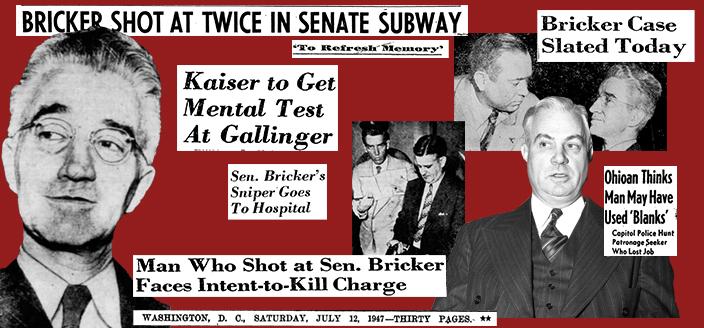
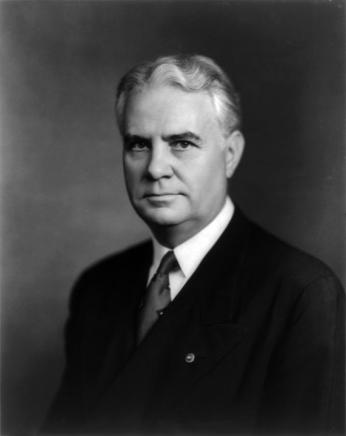
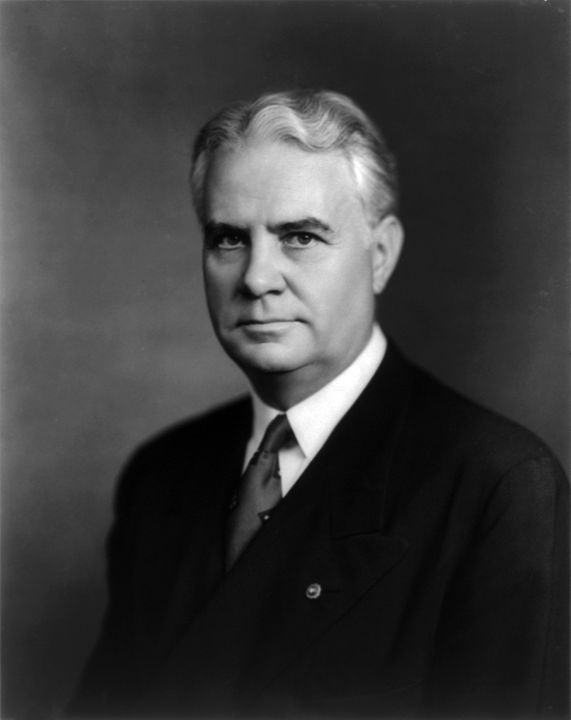
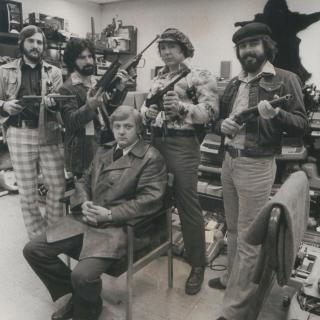

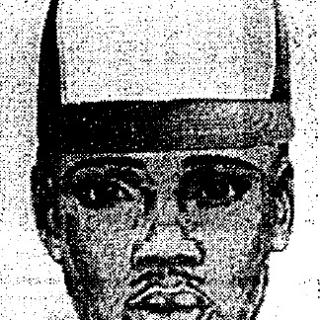
![Sketch of the mythical fuan by Pearson Scott Foresman. [Source: Wikipedia]](/sites/default/files/styles/crop_320x320/public/2023-10/Goatman_Wikipedia_Faun_2_%28PSF%29.png?h=64a074ff&itok=C9Qh-PE1)











